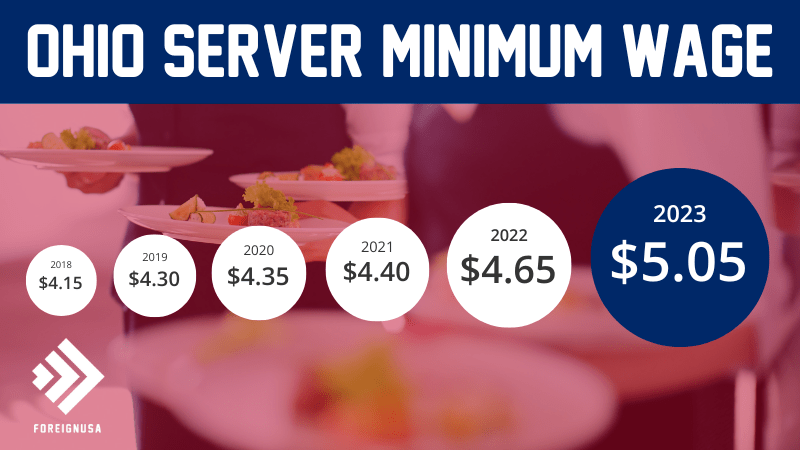If you are a server in Ohio or are considering becoming one, then you should know what the minimum wage is for servers in Ohio to see if you are being paid the correct amount, or whether this is a job you would like to do.
The laws surrounding the Ohio minimum wage for servers act as a safety net for those that may not earn enough in tips to meet the minimum wage threshold in the state.
Servers are those who provide and serve their customers with food and beverages in a restaurant or similar type of business where food and drinks are brought to the table, and as part of this service, a server will typically receive tips (gratuities) for doing so.
Ohio servers usually rely less on their hourly wage and more on the generosity of guests to make a reasonable living from being a server.
Server Minimum Wage in Ohio
So, what is the minimum wage in Ohio for waitresses? The minimum cash wage for servers in Ohio is the same as the tipped minimum wage in Ohio, which is $5.05 per hour.
This is the minimum per hour that an Ohio server must be paid and that an Ohio employer must pay its servers. The graphic below shows the OH server minimum wage rate over the years.

Ohio Server Minimum Wage 2023 (Minimum Cash Wage and Tip Credits)
$5.05 per hour may sound like a small amount to be paid an hour, but Ohio servers are required to be supplemented by their employers via “tipped credit”, which is, in Ohio’s case, $5.05 per hour, making the server minimum wage in Ohio a total of $10.10 per hour.
This is the same as the regular minimum wage in Ohio which applies to all types of employees that work in the state.
Per the tipped minimum wage laws that apply to all states, Ohio employers are required to pay their employees an hourly minimum cash wage with the addition of tip credits.
What tipped credits allow employers to do is pay tipped employees less than the minimum wage so long as they can make up the difference via tips per hour.
Tip credit not only allows server employees to be paid less than the minimum hourly wage, but it is also the same concept with bartenders, hotel workers, some airport workers, and pretty much any job role where tips are the primary income for the employee.
In Ohio, servers must be paid a base minimum cash wage of $5.05 per hour. The expectation is that Ohio servers will make at least an additional $5.05 per hour in tips on average across their pay period, and if they do, then the employer is only obligated to pay an Ohio server $5.05 per hour.
Let’s assume that a server does not make at least $5.05 per hour in tips as an average over the course of their pay period (usually two weeks), then the employer must step in and pay the Ohio server a tip credit of $5.05 per hour, so the server makes a minimum of $10.10 per hour for the duration of the pay period they worked.
Fair Labor Standards Act (FLSA) and Tipped Employees
The Federal Fair Labor Standards Act, also known as the FLSA, is a federal law from the U.S. Department of Labor.
This law establishes a national minimum wage, defines classifications for employees, and covers other essential standards and requirements for employers.
Federal law requires that employers make tipped employees aware of the cash wage paid (currently, the national direct hourly salary is $2.13 per hour), let them know about the tip credit, and explain any tip pooling systems at the workplace.
Because Ohio’s minimum wage rate is higher than the federal minimum wage rate, the state laws supersede the federal regulations.
Ohio Server Minimum Wage History
The table below showcases the current rate and history of the Ohio server minimum wage over the past 15+ years since 2008.
You can see when there were increases in the server minimum wage, which includes not only the tipped minimum wage rates but the tipped credit rates too.
| State | Tipped Server Wage | Tip Credit | Total |
|---|---|---|---|
| Ohio server minimum wage 2023 | $5.05 | $5.05 | $10.10 |
| Ohio server minimum wage 2022 | $4.65 | $4.65 | $9.30 |
| Ohio server minimum wage 2021 | $4.40 | $4.40 | $8.80 |
| Ohio server minimum wage 2020 | $4.35 | $4.35 | $8.70 |
| Ohio server minimum wage 2019 | $4.30 | $4.25 | $8.55 |
| Ohio server minimum wage 2018 | $4.15 | $4.15 | $8.30 |
| Ohio server minimum wage 2017 | $4.08 | $4.07 | $8.15 |
| Ohio server minimum wage 2016 | $4.05 | $4.05 | $8.10 |
| Ohio server minimum wage 2015 | $4.05 | $4.05 | $8.10 |
| Ohio server minimum wage 2014 | $3.98 | $3.97 | $7.95 |
| Ohio server minimum wage 2013 | $3.93 | $3.92 | $7.85 |
| Ohio server minimum wage 2012 | $3.85 | $3.85 | $7.70 |
| Ohio server minimum wage 2011 | $3.70 | $3.70 | $7.40 |
| Ohio server minimum wage 2010 | $3.65 | $3.65 | $7.30 |
| Ohio server minimum wage 2009 | $3.65 | $3.65 | $7.30 |
| Ohio server minimum wage 2008 | $3.50 | $3.50 | $7.00 |
Average Server Salary in Ohio
If you are a server or are looking to work as a server in a restaurant or similar service-related business in Ohio, knowing the hourly wage for servers is important, but knowing what you can expect to earn is even more important.
Most Ohio servers are not going to take a position at a restaurant with the view that they can only earn $10.10 per hour, because based on working 35-40 hours a week, they would only earn $353.50-$404.00 per week, and when you compare this to the cost of living in Ohio, you may struggle to make ends meet.
How much do servers make in Ohio?
The average server hourly wage in Ohio (according to the job website Indeed.com) is $13.32 per hour. So, if you were to work an 8-hour shift or a total of 8 hours in a day across a couple of shifts, you could earn (on average) about $106.56 (8 hrs x $13.32).
If you worked five days per week and rounded your daily pay to $107, then you could earn about $535 per week.
If you took just two weeks off a year and worked for 50 weeks you could earn $26,750. If you decided to take 3 weeks off per year, then you could earn 49 x $535 = $26,215 for the year. This, of course, is before Ohio income tax.
The above calculations are just averages to give you an idea of what you can earn as an Ohio server. The most important aspects of how much you can earn will depend on how good you are at your job and what type of food/beverage establishment you work at, and how busy it is.
Also, many people that work at restaurants or similar establishments are willing to work more than 40 hours per week so they qualify for overtime pay.
If the average food item on the menu is $8-$15 and the restaurant mainly serves wings, burgers, subs, nachos, fries, and similar snack-style food, then the average check for each guest or table will be much less, and therefore, the percentage tip against the total check will result in you earning less per table you serve and you’ll have to serve many tables during your shift.
On the other hand, if you work at a finer dining restaurant or one that is really busy and serves steak, seafood, and other higher-priced menu and beverage items ($25-$40 range), then you stand to earn more money as the total check for each table you serve will be that much higher and the percentage tip you receive on a higher check will be a lot more.
Final Thoughts
Perhaps the most important takeaway from this is that, as an Ohio employer, it is your responsibility to pay your servers a minimum hourly rate + tip credit that equals or surpasses the Ohio minimum wage in the event that your servers do not earn enough to meet the $10.10 per hour threshold.
Failing to do so will be breaking federal and state laws. Equally, it is important that as a server working in Ohio, you know your rights and how much you should be paid with your hourly wage and tip credits.
If you have specific questions about the laws surrounding the minimum wage for servers (tipped employees) from both an employer and employee perspective, you can contact the Ohio Department of Commerce. Additionally, if you are an employee who isn’t being paid what you legally should be, you can file a complaint with them too.


